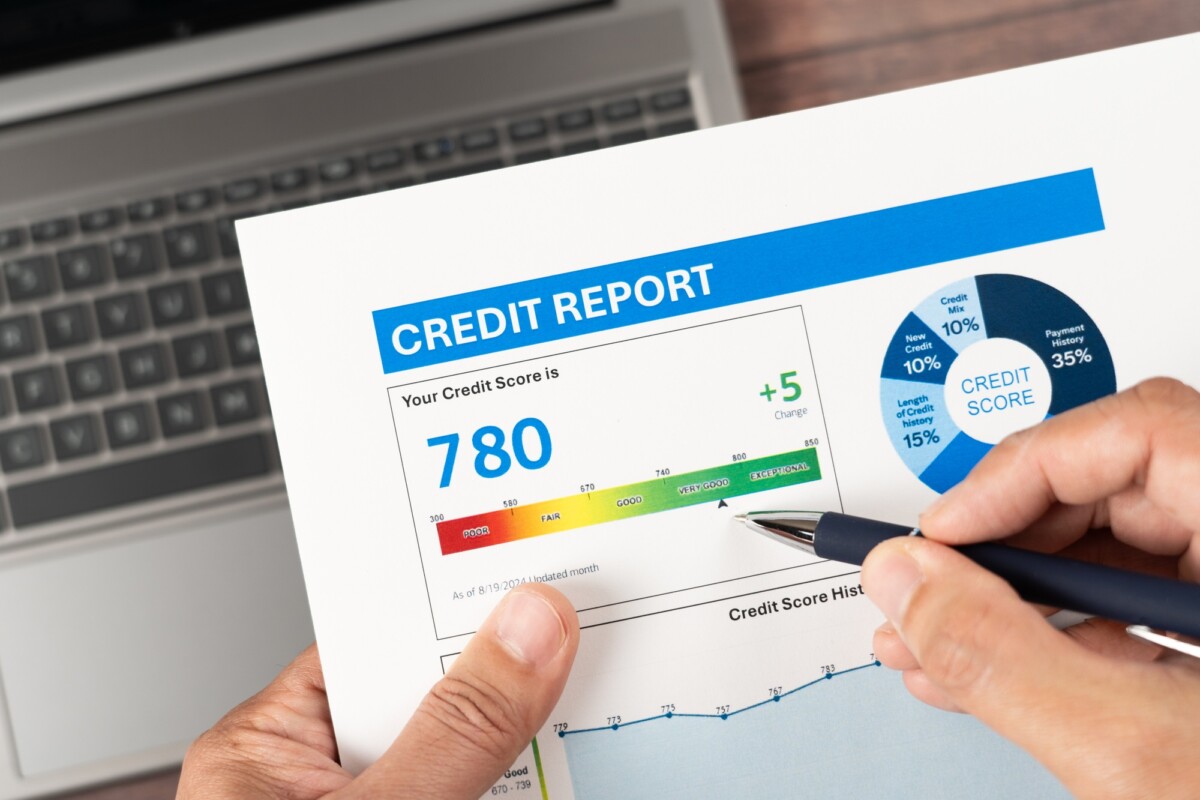
Why Does Your Credit Score Impact Loan Approval?


Understanding your credit score is crucial, especially when it comes to loan approval. Lenders use this score to assess your creditworthiness, which directly influences their decision to approve or deny your loan application. A higher credit score typically means better loan terms and lower interest rates, while a lower score can lead to higher costs or even rejection.
LeandersCashLoan – Simple, Fast Loan Approval!
A credit score is a numerical representation of your credit history, calculated based on various factors. These include your payment history, credit utilization, length of credit history, types of credit used, and recent credit inquiries. Each of these elements plays a significant role in determining your overall score.
The Credit Score Impact on Loan Approval
- Higher Scores: If your score is above 700, you are likely to qualify for favorable loan terms.
- Moderate Scores: Scores between 650 and 700 may still get you approved, but expect higher interest rates.
- Low Scores: Scores below 650 can limit your options, often leading to payday loans with bad credit, which come with high fees and interest rates.
Understanding these nuances can help you navigate the loan process more effectively.
How Does Your Credit Score Impact Loan Approval?
Understanding how your credit score impacts loan approval is crucial for anyone seeking financing. Lenders use your credit score as a key factor in determining your creditworthiness. A higher score typically signals reliability, while a lower score may raise red flags, making it harder to secure loans.
The Role of Credit Scores in Loan Decisions
Your credit score reflects your financial behavior, including payment history and credit utilization. Lenders assess this score to gauge the risk of lending to you. A strong credit score can lead to better loan terms, while a poor score might limit your options, especially for larger loans.
Payday Loans with Bad Credit
If you have a low credit score, you might consider payday loans with bad credit. These loans are often easier to obtain but come with higher interest rates and fees. While they can provide quick cash, it’s essential to understand the potential pitfalls before proceeding.
The Role of Credit History in Loan Decisions
Understanding why your credit score impacts loan approval is crucial for anyone seeking financing. Lenders use your credit score as a key indicator of your financial reliability. A higher score suggests that you are a responsible borrower, while a lower score may raise red flags about your ability to repay loans.
The Significance of Credit Scores
Credit scores typically range from 300 to 850, with higher scores indicating better creditworthiness. Lenders often set minimum score requirements for different types of loans. For instance, if you’re considering payday loans with bad credit, you might find options available, but they often come with higher interest rates due to the perceived risk.
How Credit History Affects Loan Terms
- Interest Rates: A lower credit score can lead to higher interest rates, increasing the overall cost of borrowing.
- Loan Amounts: Lenders may limit the amount you can borrow based on your credit score.
- Approval Chances: A poor credit history can significantly decrease your chances of loan approval, making it essential to monitor and improve your credit score before applying.
LeandersCashLoan: Fast Funds, No Hidden Fees – Apply Today!
What Lenders Look for Beyond Your Credit Score
Understanding the credit score’s role in loan approval is crucial for anyone seeking financing. While a good credit score can significantly enhance your chances of approval, lenders consider various other factors before making a decision. This comprehensive evaluation helps them assess your overall financial health and ability to repay the loan.
Income Stability
Lenders often review your income to ensure you have a steady source of funds. A consistent income stream indicates that you can manage monthly payments, even if your credit score isn’t perfect.
Debt-to-Income Ratio
Your debt-to-income (DTI) ratio is another critical factor. This ratio compares your monthly debt payments to your gross monthly income. A lower DTI suggests that you can handle additional debt, making you a more attractive candidate for loans, including payday loans with bad credit.
Employment History
A stable employment history can also work in your favor. Lenders prefer borrowers who have been in the same job for a significant period, as it reflects reliability and financial stability.
In summary, while the credit score impact on loan approval is significant, lenders look at a broader picture, including income, DTI, and employment history, to make informed decisions.
Also Read: How Do Payday Loans with Bad Credit Work?
Can You Improve Your Credit Score Before Applying for a Loan?
Your credit score plays a crucial role in determining your eligibility for loans. Lenders use this score to assess your creditworthiness, which directly impacts loan approval. A higher credit score generally means better loan terms, while a lower score can lead to higher interest rates or even denial of your application. Understanding the credit score impact on loan approval is essential for anyone considering borrowing money.
Improving your credit score before applying for a loan is not only possible but advisable. Here are some effective strategies:
Pay Your Bills on Time
Timely payments significantly boost your credit score. Set reminders or automate payments to ensure you never miss a due date.
Reduce Your Credit Utilization
Aim to keep your credit utilization below 30%. This means using less than 30% of your available credit, which positively affects your score.
Check Your Credit Report
Regularly review your credit report for errors. Disputing inaccuracies can lead to score improvements, making you more attractive to lenders.
Consider Payday Loans with Bad Credit
If you need immediate funds, payday loans with bad credit may be an option. However, be cautious of high-interest rates and ensure you can repay them on time.
The Consequences of a Low Credit Score on Loan Approval
Understanding the credit score’s role in loan approval is crucial for anyone seeking financial assistance. Lenders use credit scores as a primary factor in determining the risk of lending money. A low credit score can signal to lenders that you may struggle to repay a loan, leading to potential rejection or higher interest rates.
Increased Interest Rates
A low credit score often results in higher interest rates on loans. Lenders view borrowers with poor credit as high-risk, which means they compensate for this risk by charging more. This can significantly increase the total cost of borrowing, making it harder to manage repayments.
Limited Loan Options
With a low credit score, your options for loans become limited. Many traditional lenders may deny your application altogether. Instead, you might have to consider alternatives like payday loans with bad credit, which often come with exorbitant fees and unfavorable terms.
Impact on Loan Amount
A low credit score can also affect the amount you can borrow. Lenders may restrict the loan amount to minimize their risk, leaving you with insufficient funds for your needs. This can hinder your ability to make significant purchases or investments.
How LendersCashLoan.com Can Help You Navigate Loan Applications
Understanding the credit score’s role in loan approval is crucial for anyone seeking financial assistance. Lenders use your credit score to assess your creditworthiness, which directly influences their decision to approve or deny your loan application. A higher credit score typically leads to better loan terms, while a lower score can limit your options.
The Importance of Your Credit Score
Your credit score impacts loan approval by reflecting your financial history. It indicates how reliably you repay debts, which lenders consider when evaluating risk. A strong credit score can open doors to favorable interest rates and larger loan amounts, while a poor score may restrict your choices, especially for payday loans with bad credit.
Tips for Improving Your Credit Score
- Pay bills on time: Consistent payments boost your score.
- Reduce debt: Lowering credit card balances can improve your credit utilization ratio.
- Check your credit report: Regularly review for errors that could negatively impact your score.
By understanding these factors, you can better navigate the loan application process and improve your chances of approval.
Tips for Maintaining a Healthy Credit Score
Understanding why your credit score impacts loan approval is crucial for anyone seeking financial assistance. Lenders use your credit score as a key indicator of your creditworthiness. A higher score suggests you are a responsible borrower, making it easier to secure loans with favorable terms.
The Role of Credit Scores in Loan Approval
Your credit score reflects your financial history, including payment habits and outstanding debts. Lenders assess this score to gauge the risk of lending you money. If your score is low, you may face higher interest rates or even denial of loans, including payday loans with bad credit.
- Pay Bills on Time: Consistent, timely payments boost your score.
- Keep Credit Utilization Low: Aim to use less than 30% of your available credit.
- Limit New Credit Applications: Each application can temporarily lower your score.
- Regularly Check Your Credit Report: Spot errors early to correct them promptly.
FAQs
-
How does my credit score affect loan approval?
A higher credit score increases your chances of getting approved for a loan with better interest rates and terms, while a lower score may lead to higher fees or rejection. -
Can I get a loan with a low credit score?
Yes, some lenders offer bad credit loans, but they often come with higher interest rates, shorter repayment terms, and stricter conditions. -
What is the minimum credit score needed for loan approval?
The minimum score depends on the loan type. Traditional personal loans may require 600 or higher, while payday loans and no-credit-check loans have no strict minimum. -
Do payday loans impact my credit score?
Payday loans typically don’t affect credit unless you miss payments and the lender sends the debt to collections, which can lower your score. -
How can I improve my credit score before applying for a loan?
Pay bills on time, reduce credit card balances, check your credit report for errors, and avoid multiple hard inquiries before applying for a loan.
LeandersCashLoan: Apply Now for Same-Day Cash!
🔗At ExpressCash, we’re here to help guide you through the process and find the right financial solution for your specific situation.





